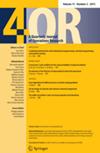The Effect of Corneal Collagen Cross-Linking on Higher Order Aberrations in Keratoconus
IF 2.6
4区 管理学
Q3 OPERATIONS RESEARCH & MANAGEMENT SCIENCE
引用次数: 0
Abstract
Purpose: To assess the changes in ocular high order aberrations after collagen cross linking for keratoconus. Patients and Methods: This study included 30 eyes with confirmed KCN. Baseline evaluation focused on: UDVA and BSCVA using logMAR notation, MRSE, corneal topography using Orbscan IIZ and wave-front aberrometry using Zywave II. CXL was performed per ‘Dresden protocol’ through a 30-minutes exposure to 370 nm UVA with an irradiance of 3 mW/cm 2. Patients had comprehensive ophthalmic evaluation after 6 months with special attention to: UDVA, BSCVA, MRSE, corneal topography and wave-front aberrometry changes. Results: The mean age was 25.5±5.84 (20:31) years. After 6 months, there was a significant decrease in corneal thickness from 493.2± 24.17μ to 486.7±24.26μ (P<0.05) and a significant decrease in K max from 47.4±1.17D to 46.1±1.17D (P<0.05). BSCVA improved from preoperative value (0.00:0.5 logMAR (median 0.3)) to 6 months’ value (0.1:1.00 logMAR (median 0.2) (P <0.05). Preoperative MRSE was -7.25: -0.5D (median -2.85D) and at 6 months was -6.25: -0.5D (median Case Study Moharam et al.; OR, 14(2): 1-8, 2021; Article no.OR.65865 2 2.125D) (P<0.05). A significant correlation was found at 6 months between changes in both BSCVA and: K max (P<0.001), corneal thickness (P<0.05), vertical coma (P<0.001) and trefoil (P<0.001). Conclusions: Improvement in HOA was detected after CXL for KCN. The changes in total, vertical coma and vertical trefoil aberrations were significantly correlated with postoperative improvement in BSCVA. Thus, improvement in HOA profile after CXL is one of the explanations of improvement in visual function after CXL in KCN.角膜胶原交联对圆锥角膜高阶像差的影响
目的:探讨圆锥角膜胶原交联术后高阶像差的变化。患者和方法:本研究纳入确诊KCN的30只眼。基线评估集中在:使用logMAR标记的UDVA和BSCVA,使用MRSE,使用Orbscan IIZ的角膜地形图和使用Zywave II的波前像差测量。CXL按照“德累斯顿方案”进行,暴露于370 nm UVA下30分钟,辐照度为3 mW/ cm2。6个月后对患者进行全面的眼科评估,特别关注:UDVA、BSCVA、MRSE、角膜地形图和波前像差变化。结果:平均年龄25.5±5.84(20:31)岁。6个月后,角膜厚度由493.2±24.17μ降至486.7±24.26μ (P<0.05), K max由47.4±1.17D降至46.1±1.17D (P<0.05)。BSCVA从术前值(0.00:0.5 logMAR(中位数0.3))改善至6个月值(0.1:1.00 logMAR(中位数0.2))(P <0.05)。术前MRSE为-7.25:-0.5D(中位数为-2.85D), 6个月时为-6.25:-0.5D(中位数病例研究Moharam等;Or, 14(2): 1- 8,2021;文章no.OR。2.125d) (p <0.05)。6个月时BSCVA与:K max (P<0.001)、角膜厚度(P<0.05)、垂直昏迷(P<0.001)和三叶草(P<0.001)的变化有显著相关性。结论:KCN患者行CXL后HOA有所改善。总、垂直昏迷和垂直三叶像差的变化与BSCVA术后改善显著相关。因此,CXL后HOA剖面的改善是KCN患者CXL后视觉功能改善的原因之一。
本文章由计算机程序翻译,如有差异,请以英文原文为准。
求助全文
约1分钟内获得全文
求助全文
来源期刊

4or-A Quarterly Journal of Operations Research
管理科学-运筹学与管理科学
CiteScore
3.80
自引率
5.00%
发文量
26
审稿时长
6 months
期刊介绍:
4OR - A Quarterly Journal of Operations Research is jointly published by the Belgian, French and Italian Operations Research Societies. It publishes high quality scientific papers on the theory and applications of Operations Research. It is distributed to all individual members of the participating societies.
 求助内容:
求助内容: 应助结果提醒方式:
应助结果提醒方式:


